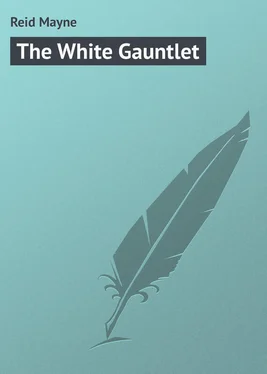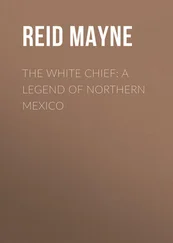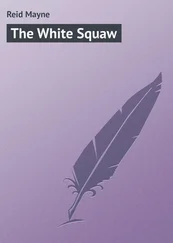Mayne Reid - The White Gauntlet
Здесь есть возможность читать онлайн «Mayne Reid - The White Gauntlet» — ознакомительный отрывок электронной книги совершенно бесплатно, а после прочтения отрывка купить полную версию. В некоторых случаях можно слушать аудио, скачать через торрент в формате fb2 и присутствует краткое содержание. Жанр: foreign_prose, foreign_children, на английском языке. Описание произведения, (предисловие) а так же отзывы посетителей доступны на портале библиотеки ЛибКат.
- Название:The White Gauntlet
- Автор:
- Жанр:
- Год:неизвестен
- ISBN:нет данных
- Рейтинг книги:5 / 5. Голосов: 1
-
Избранное:Добавить в избранное
- Отзывы:
-
Ваша оценка:
- 100
- 1
- 2
- 3
- 4
- 5
The White Gauntlet: краткое содержание, описание и аннотация
Предлагаем к чтению аннотацию, описание, краткое содержание или предисловие (зависит от того, что написал сам автор книги «The White Gauntlet»). Если вы не нашли необходимую информацию о книге — напишите в комментариях, мы постараемся отыскать её.
The White Gauntlet — читать онлайн ознакомительный отрывок
Ниже представлен текст книги, разбитый по страницам. Система сохранения места последней прочитанной страницы, позволяет с удобством читать онлайн бесплатно книгу «The White Gauntlet», без необходимости каждый раз заново искать на чём Вы остановились. Поставьте закладку, и сможете в любой момент перейти на страницу, на которой закончили чтение.
Интервал:
Закладка:
And, as if the reflection had suggested the necessity of making as much of the time as possible, the young horseman gave the whip to his steed; shot out from between the parapet walls of the bridge; and passed on at a canter.
Though Walter Wade had pronounced himself a man – somewhat modestly it must be admitted – the statement was scarcely correct; and the error must be attributed to a very common and pardonable weakness of boyhood, ambitious of entering upon manhood.
He was still only a stripling – a youth of nineteen – though well grown for his age; and in point of size might have passed muster among men. A slight moustache already appeared upon his upper lip. It was light-coloured, like his hair – neither of which was red, but of that Saxon “yellow” so often associated with eyes of blue, and which, when met with in woman, presents the fairest type of female beauty.
The Greeks – themselves a dark people, above all others skilled in feminine charms – have acknowledged this truth; though, by that acknowledgment, ignoring the claims of their own race.
To the spume of the sea was the Cyprian goddess indebted for the whiteness of her skin – to the blue sky for the colour of her eyes – to the golden sun for the hue of her hair. Among the classic ancients, the dark-haired Venus elicited but little admiration.
And not very different is the partiality of the moderns. The belle of the ball-room is invariably a blonde ; and even the nymphe du pavé , who trails golden pennants from under the rim of her coquettish hat, looks scornfully askance at the darker tresses of her sister in sin!
It is odd that blue eyes do not admire blue eyes – that light-coloured tresses do not wish to be interwoven with those of a like hue. Is there an instinct of approximation between extremes? Do contrasts possess an innate desire for contiguity? If so, it would explain the penchant of the dark Athenians for the fair-skinned Cytherea.
There are fair-haired youths whom man may admire, and woman love. Walter Wade was such an one.
A forehead of fine expanse, crested with curling hair – a nose sufficiently aquiline to exhibit the true aristocratic breed – a chin prominent – lips typical of contempt for aught that was mean. Such were his features.
Gazing upon his face, you might not pronounce it handsome. For a man, it might appear too feminine. But if you were at all skilled in Saxon physiognomy, on seeing such a face, and knowing that the owner of it had a sister, you might safely set her down as a being of incomparable beauty.
It was not necessary to have overheard his soliloquy, to tell that he who made it was the scion of some distinguished house. The good steed he bestrode, caparisoned in costly fashion; the rich costume he wore; his sharply chiselled features, and aristocratic bearing – all betokened the filius nobilis .
He was, in effect, the son of Sir Marmaduke Wade, of Bulstrode Park; who could point to an ancestry older than the Conquest; and whose Saxon sires – along with the Bulstrodes, the Hampdens, and the Penns – had so doughtily defended their beechen woods and broad fields against the Norman invader, that the great Conqueror was pleased to compound with them for a continuance of their tenure. It was a family with whom kings had never been favourites. It had figured among the barons, who had forced the tyrant John to set his signature to the celebrated Charter of English liberty; and elsewhere have its representatives been found in the front rank of the champions of Freedom.
It may be wondered why young Walter Wade had been in the service of the Court – as declared in his soliloquy. That, however, is easily explained. An ambitious mother, of queenly inclinings – an uncle in high office near the throne – these will account for the son of Sir Marmaduke having stood as a page in the Presence.
But the mother’s influence was now at an end. She was no more. And that of her brother – the uncle – was not strong enough to prevent Sir Marmaduke recalling his son from a Court – whose immorality had become the theme of every tongue; and whose contamination the fond father but too justly dreaded.
This was why the stripling was on his return to the paternal mansion; and why the king had shown displeasure at parting with him. It was a bold act on the part of the knight; and it might need all the influence of his official brother-in-law, to avert from him the vengeance of Charles – that most contemptible of tyrants.
It was not upon these things that Walter Wade was reflecting, as he rode onward. A pleasanter theme was the subject of his thoughts – his cousin Lora.
It was love’s young dream – by some deemed the sweetest in life; is, perhaps, the most evanescent.
With Walter, it had not been so very fleeting. Starting at sixteen, it was now nearly three years old. It had stood the test of a long absence, and under circumstances most unfavourable to love’s endurance: amid smiling maids of honour, and dames of high degree. Yes; Walter’s heart had nobly repelled the blandishments of more than one belle; and this too in a Court famed for its fair .
That kiss, somewhat coyly granted by his cousin, “deep in a forest dell,” where they had wandered in search of wild flowers – that soft pressure of Lora’s little hand – those thrilling words, “Dear Walter,” that on the same occasion had fallen from Lora’s pretty lips – all were remembered, as if they had been incidents of yesterday.
Did she remember them with equal interest? This was the thought upon which Walter Wade had been dwelling, ever since parting from the portals of Whitehall Palace.
During his two years of absence, he had not been left altogether uninformed of what was passing at Bulstrode. Though in those days letters were written at long intervals – and then only on matters of grand importance – Walter had kept up a correspondence with Marion; with whom epistles had been exchanged regularly once a month. He dared not write to Lora – nor even about her. He knew what he said to his sister would be communicated to his little mistress; and he feared to show himself too solicitous. Every word in his letters, relating to his cousin, had been carefully studied – as to the impression it might produce – for in this sort of strategy, young love is as cunning as that of older hearts. At times the boy courtier even affected indifference about his cousin’s affairs; and more than once there was danger of a quarrel – or at least a coolness. This was more especially the case, when his sister – ignorant of the pain she was producing – spoke of Lora’s great beauty, and the havoc it was making among the hearts of the county beaux.
Perhaps had Marion passed these pretty compliments upon herself, she would have said nothing beyond what was true: for although Walter’s cousin was beautiful and a belle, his sister was at that time the acknowledged “belle of the shire.”
Volume One – Chapter Six
For the first half-mile after crossing the Colne, the thoughts of the young courtier had been given exclusively to his cousin. He recalled the old time – that scene in the silent dell – the kiss among the wild flowers – that proved her partiality for him. He remembered all these occurrences with a strong confidence in Lora’s loyalty.
His fanciful reflections were suddenly, and somewhat rudely, interrupted.
On arriving at an inn that stood by the roadside, a spectacle was presented to his eyes which turned his thoughts into a different channel.
In a wide open space in front of the hostelry was a troop of horsemen. By their armour and equipments, Walter knew them to be cuirassiers , in the service of the king.
Читать дальшеИнтервал:
Закладка:
Похожие книги на «The White Gauntlet»
Представляем Вашему вниманию похожие книги на «The White Gauntlet» списком для выбора. Мы отобрали схожую по названию и смыслу литературу в надежде предоставить читателям больше вариантов отыскать новые, интересные, ещё непрочитанные произведения.
Обсуждение, отзывы о книге «The White Gauntlet» и просто собственные мнения читателей. Оставьте ваши комментарии, напишите, что Вы думаете о произведении, его смысле или главных героях. Укажите что конкретно понравилось, а что нет, и почему Вы так считаете.












